小学牛津英语6ATest for Module2
牛津小学英语6AUnit2第二课时教案(1)
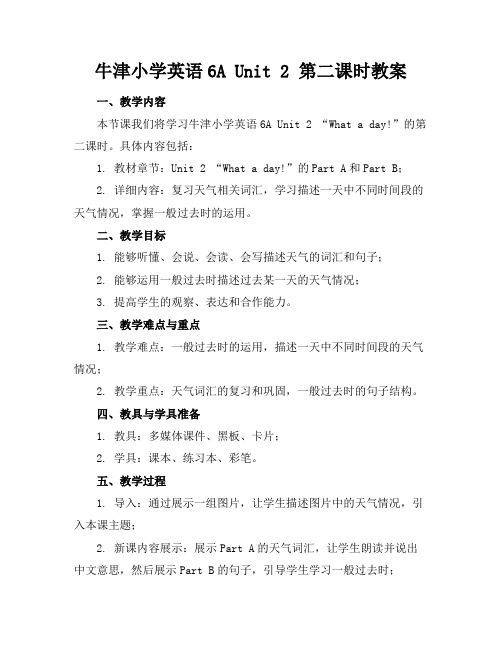
牛津小学英语6A Unit 2 第二课时教案一、教学内容本节课我们将学习牛津小学英语6A Unit 2 “What a day!”的第二课时。
具体内容包括:1. 教材章节:Unit 2 “What a day!”的Part A和Part B;2. 详细内容:复习天气相关词汇,学习描述一天中不同时间段的天气情况,掌握一般过去时的运用。
二、教学目标1. 能够听懂、会说、会读、会写描述天气的词汇和句子;2. 能够运用一般过去时描述过去某一天的天气情况;3. 提高学生的观察、表达和合作能力。
三、教学难点与重点1. 教学难点:一般过去时的运用,描述一天中不同时间段的天气情况;2. 教学重点:天气词汇的复习和巩固,一般过去时的句子结构。
四、教具与学具准备1. 教具:多媒体课件、黑板、卡片;2. 学具:课本、练习本、彩笔。
五、教学过程1. 导入:通过展示一组图片,让学生描述图片中的天气情况,引入本课主题;2. 新课内容展示:展示Part A的天气词汇,让学生朗读并说出中文意思,然后展示Part B的句子,引导学生学习一般过去时;3. 例题讲解:讲解一般过去时的句子结构,通过例句进行解释;4. 随堂练习:让学生用一般过去时描述过去某一天的天气情况,邀请部分学生上台展示;5. 小组活动:分组讨论,让学生互相描述一天中不同时间段的天气情况,提高学生的合作能力;7. 作业布置:布置课后作业,要求学生用一般过去时描述过去一天的天气情况。
六、板书设计1. 天气词汇:sunny, cloudy, windy, rainy, snowy;2. 一般过去时的句子结构:主语 + 动词过去式 + 其他;3. 课堂练习示例。
七、作业设计1. 作业题目:请用一般过去时描述你昨天一天的天气情况;2. 答案示例:Yesterday was a sunny day. I got up at 7:00, and it was still sunny. I had breakfast and went to school. In the afternoon, it became cloudy, and there was a light rain. I finished my homework and watched TV after dinner.八、课后反思及拓展延伸1. 反思:关注学生在课堂上的参与度,了解他们对一般过去时的掌握情况,针对学生的困难进行个别辅导;2. 拓展延伸:鼓励学生在课后观察天气变化,用一般过去时记录下来,提高他们的观察和表达能力。
牛津英语6A模块二测试
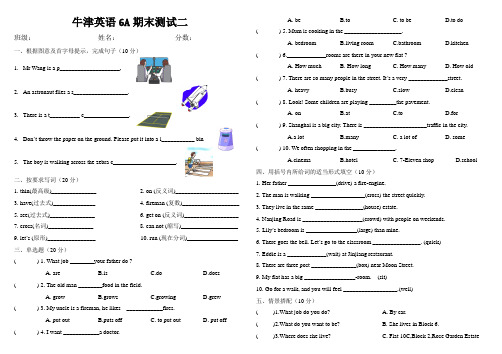
牛津英语6A期末测试二班级:_____________ 姓名:_____________ 分数:_____________一、根据图意及首字母提示,完成句子(10分)1.Mr Wang is a p____________________,2.An astronaut flies a s__________________.3.There is a t__________ c_______________.4.Don’t throw the paper on the ground. Please put it into a l___________ bin5.The boy is walking across the zebra c_____________________.二、按要求写词(20分)1. thin(最高级)_______________2. on (反义词)_____________________3. have(过去式)______________4. fireman (复数)___________________5. see(过去式)_______________6. get on (反义词)__________________7. cross(名词)_______________8. can not (缩写)___________________9. let’s (原形)________________ 10. run (现在分词)_________________三、单选题(20分)( ) 1. What job ________your father do ?A. areB.isC.doD.does( ) 2. The old man ________food in the field.A. growB.growsC.growingD.grew( ) 3. My uncle is a fireman, he likes ____________fires.A. put outB.puts offC. to put outD. put off ( ) 4. I want ____________a doctor.A. beB.toC. to beD.to do ( ) 5. Mum is cooking in the ___________________.A. bedroomB.living roomC.bathroomD.kitchen ( ) 6._____________rooms are there in your new flat ?A. How muchB. How longC. How manyD. How old ( ) 7. There are so many people in the street. It’s a very _____________street.A. heavyB.busyC.slowD.clean ( ) 8. Look! Some children are playing _________the pavement.A. onB.atC.toD.for ( ) 9. Shanghai is a big city. There is _____________________traffic in the city.A.a lotB.manyC. a lot ofD. some ( ) 10. We often shopping in the ______________.A.cinemaB.hotelC. 7-Eleven shopD.school四、用括号内所给词的适当形式填空(10分)1. Her father ________________(drive) a fire-engine.2. The man is walking __________________(cross) the street quickly.3. They live in the same ________________(house) estate.4. Nanjing Road is ____________________(crowd) with people on weekends.5. Lily’s bedroom is _________________(large) than mine.6. There goes the bell. Let’s go to the classroom ________________. (quick)7. Eddie is a _____________(wait) at Jinjiang restaurant.8. There are three post _______________(box) near Moon Street.9. My flat has a big _________________-room. (sit)10. Go for a walk, and you will feel __________________.(well)五、情景搭配(10分)( )1.What job do you do? A. By car.( )2.What do you want to be? B. She lives in Block 6.( )3.Where does she live?C. Flat 10C,Block 2,Rose Garden Estate( )4.What’s your address? D. A policeman.( )5.How do you go to school? E. I am a teacher.六、按要求改写句子(10分)1. I can see some traffic lights. (改成一般疑问句)__________ you see ______________traffic lights ?2. Cross the road now .(改成否定句)__________________ _____________ the road now.3. The man teaches us English .(改成一般疑问句)___________________the man________________us English ?4.He sometimes takes a bus to school. (改成同义句)He sometimes ______________to school ____________ ___________.5.My sister is a shop assistant. (就划线部分提问)____________ job ____________your sister ______________?七、阅读理解(10分)(A)选择恰当的单词或短语,完成短文I live in Pudong New Area. My flat is on the 25th floor in a (1) . From the window of my room, I can (2) the big city and the Huangpu River. The Huangpu River is very busy (3) . A lot of ships come in and (4) . I can see the Shanghai Radio and TV Tower and Yangpu Bridge, too. (5) them are very wonderful. Our city is great. I like it very much.( ) 1. A.building B.room C.office D.house ( ) 2. A.know B.look at C.watch D.see ( ) 3. A.day and night e and goC.up and downD.time and time( ) 4. A.go away B.go down C.go out D.go into ( ) 5. A.One of B.Both of C.Any of D.All of(B)Mrs Brown is a nurse. She lives in Flat 7A Block 5 of Rose Garden Estate. Her flat has two bedrooms, a bathroom,a sitting-room and a kitchen. It is not big. Mrs Brown drives to work from Monday to Friday. She likes her job very much. She is a very good nurse. But sometimes she is late for work, because the road is always crowded with traffic and she can’t drive quickly. She doesn’t work at weekends. She always at home with her dog, Tony.判断下列句子是否符合表格内容,符合的用“T”表示,不符合的用“F”表示。
2024年牛津小学英语6AUnit2教案精选

2024年牛津小学英语6A Unit2 教案精选�一、教学内容二、教学目标1. 能够听懂、会说、会读、会写本节课所学的词汇和句型,如library, classroom, playground, I like math because, My favourite subject is等。
2. 能够运用所学知识,描述自己的学校和喜欢的学科,进行简单的校园生活交流。
3. 培养学生的合作精神,提高学生的听说读写综合运用能力。
三、教学难点与重点1. 教学难点:词汇的拼写和句型的运用。
2. 教学重点:描述学校和表达个人喜好。
四、教具与学具准备1. 教具:多媒体课件、黑板、磁带、录音机等。
2. 学具:英语课本、练习册、笔、纸等。
五、教学过程1. 导入:通过展示一组学校图片,引导学生用英语描述,复习已学过的相关词汇,为新课的学习做好铺垫。
2. 新课呈现:展示Chapter 1和Chapter 2的图片,引导学生学习新词汇和句型,并进行例句展示。
3. 例题讲解:结合课本例句,对词汇和句型进行讲解,让学生明白如何运用。
4. 随堂练习:分组进行口语练习,让学生互相描述学校和喜欢的学科,教师进行指导。
5. 巩固练习:播放听力材料,让学生完成练习册上的相关习题,巩固所学知识。
六、板书设计1. Unit 2 My School and My Favourite Subject2. 主要内容:Chapter 1: My School (library, classroom, playground) Chapter 2: My Favourite Subject (I like math because, My favourite subject is)七、作业设计1. 作业题目:Write about your school and favourite subject.Answer the following questions:1. What is your favourite subject? Why?2. What do you like to do at school?2. 答案示例:My school is big and beautiful. It has a library, many classrooms and a playground. My favourite subject is math because it is interesting. I enjoy reading books in the library and playing games on the playground.八、课后反思及拓展延伸1. 反思:关注学生的课堂表现,了解学生对词汇和句型的掌握情况,调整教学方法,提高教学效果。
牛津小学英语6A Unit2课时练习

牛津小学英语6A Unit2课时练习牛津小学英语6a unit2课时练习(a)一、判断下列每组单词画线部分的发音是否相同, 用“√”或“×”表示。
1.january april ( )2.march partner ( )3. june july ( )4. september december ( )5.second october( ) 6 .first third ( )7. octobernovember ( ) 8.may say ( ) 9.a ugust puppet ( )10.would should ( ) 11.present december( )12.as present ( )二、写出基数词或序数词13.one____________________ 17.fifth_______________ 21.twenty-one _______14.two____________________ 18.six_________________ 22.thirty ___________15.three __________________ 19.ninth_______________ 23.forty______________16.four ____________________ 20.eighth_______________ 24.sixteen ___________三、英汉互译25. 五月四日 30. 在九月十日26. 你的生日 31. 第二十一27.想要 32. some balloons28. 作为生日礼物 33. in january29.八月一日 34. on the eighth of june四、用所给动词的适当形式填空。
35. look ! yang ling (draw) a picture.36. we must__________(listen )to the teacher in class.37. all of us should ___________(keep ) the grass.off38. tom ( get ) up at 6:30 every morning .39. do they like (skate)40.can you ______(make) a kite for me ? yes,i (make) a kite now.41.my birthday (be) on the first of january. .42.what does your brother (like)?he (like) playing the piano.五、根据句意及首字母提示,拼写单词。
小学牛津英语6ATest for Module2

Test for Module2Part one Listening(第一部分听力)一. Listen and choose the right pictures (根据你听到的内容,选出相应的图片)二、Listen to the dialogues and choose the best answer to the question you hear (根据你听到的对话和问题,选出最恰当的答案)( )6. . B. Rainy. C. Sunny. D. Cloudy.( ) a supermarket. a bookstore. a library. a ticket office.( )8. A. A teacher. B. A businessman. C. A policeman. D. An engineer.( ) match was interesting. match was exciting.match was boring. match was relaxing.( ) and reader. and student. C. Brother and sister. and son.( )11. A. 7:30. B. 7:45. C. 7:00. D. 7:15.( ) . and maths. .( ) hours. hour and a half. minutes. minutes.三.Listen to the passage and tell whether the following statements are true or false (判断下列句子是否符合你听到的短文内容,符合的用’’T’’表示,不符合的用’’F’’表示)( )'father works in a shop and his mother works in a cinema.( ) takes a bus to school and goes home on foot.( ) likes to play with water.( )'s father wants to punish him but his moth er doesn’t.( )'s clothes are wet because he plays in the rain.( ) doesn’t want to play in the water the third day.四.Listen to the passage and complete the following sentences (听短文,完成下列内容,每空格限填一词)paper of books and__________ is made from wood.people burn wood to keep themselves__________ in winter.22. __________, wood is very important for our living.cut__________ trees in mountains every year.have to take __________care of our mountains so that they may always be covered with greentrees.Part Two Vocabulary and Grammar(第二部分词汇和语法)一.Choose the best answer (选择最恰当的答案)( )25. Which of the following underlined parts is different in pronunciation from the others( )26. There is______ ''s'' and______''u'' in the word ''use''.,a , an , an , a( )27. Mary is swimming______the river.across( ) -I am leaving for the exam.—Well, make sure you have got______ready.( )29. I can’t see the blackboard clearly. Two boys are sitting me.front of to( )30. —Must I clean the room now—No, you______. You can do it tomorrow.’t’t.’t’t( )31. It is the library! So you______know shouting is not allowed here.( )32. It is kind of you to______so much time showing me around your school.( )33. — It is all right to speak and laugh loudly______.—No, I don’t think so.public least time D. all the time( )34. The teacher asked Ben______a difficult question in class.answer( )35. Boys and girls,______up your hands when you know the answer.A. puttingB. to putC. putD. puts( )36. I______the film. I don’t want to see it again.seen see( )37. Tommy doesn’t visit his grandfather, but he______sends e-mails.( )38. — How do you do______, thank you. right. C. How do you do D. How are you( )39. —Please bring little Tom here next time.—______. Thank you.will do C. That’s right D. My pleasure二. Complete the following passage with the words or phrases in the box. Each can onlybe used once (将下列单词或词组填入空格。
牛津小学英语6AUnit2第二课时教案

牛津小学英语6A Unit 2 第二课时教案一、教学内容本节课我们将学习牛津小学英语6A Unit 2 "What a day!"的第二课时内容。
具体章节为:Part B, Let's talk和Part C, Let's learn。
我们将详细学习天气相关的词汇和表达方式,以及如何描述一天中不同时间段的天气变化。
二、教学目标1. 能够听懂并准确说出表示天气的词汇,如:sunny, cloudy, windy, rainy等。
2. 能够用英语描述一天中不同时间段的天气情况,并运用所学句型进行交流。
3. 提高学生的听说能力和小组合作能力,激发他们学习英语的兴趣。
三、教学难点与重点教学难点:如何灵活运用天气词汇和句型描述一天中的天气变化。
教学重点:掌握天气词汇和句型的正确用法,以及听力技巧。
四、教具与学具准备1. 教具:录音机、磁带、PPT、卡片。
2. 学具:课本、练习本、彩色笔。
五、教学过程1. 导入:通过播放一首关于天气的英文歌曲,引导学生关注本节课的主题。
2. 新课内容展示:展示PPT,呈现本节课所学的天气词汇和句型,让学生跟读并模仿。
3. 例题讲解:以教材中的对话为例,讲解如何运用所学的天气词汇和句型描述一天中的天气变化。
4. 随堂练习:让学生分组进行角色扮演,练习描述不同时间段的天气情况。
5. 小组活动:每组选择一天中的某个时间段,用所学的词汇和句型编写对话,并进行展示。
六、板书设计1. 天气词汇:sunny, cloudy, windy, rainy等。
2. 句型: What's the weather like in themorning/afternoon/evening? It's sunny/cloudy/windy/rainy.3. 例句:In the morning, it's sunny. In the afternoon,it's cloudy.七、作业设计1. 作业题目:根据本节课所学内容,编写一个关于一天中天气变化的对话。
牛津沪教版英语六年级上6A寒假复习Module 2辅导讲义
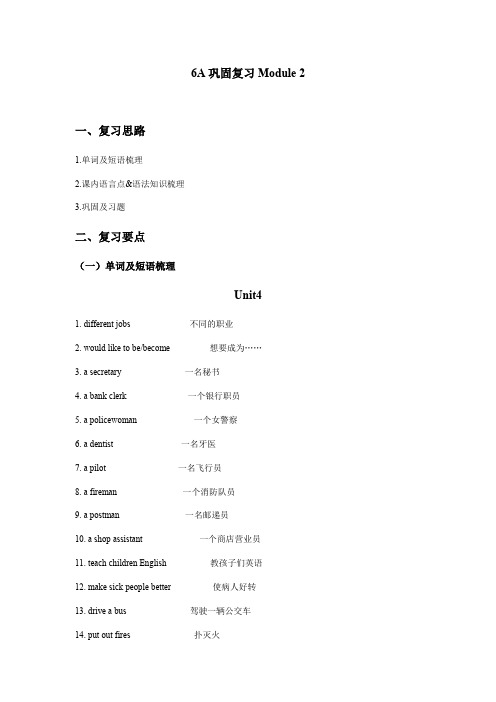
6A巩固复习Module 2一、复习思路1.单词及短语梳理2.课内语言点&语法知识梳理3.巩固及习题二、复习要点(一)单词及短语梳理Unit41. different jobs 不同的职业2. would like to be/become 想要成为……3. a secretary 一名秘书4. a bank clerk 一个银行职员5. a policewoman 一个女警察6. a dentist 一名牙医7. a pilot 一名飞行员8. a fireman 一个消防队员9. a postman 一名邮递员10. a shop assistant 一个商店营业员11. teach children English 教孩子们英语12. make sick people better 使病人好转13. drive a bus 驾驶一辆公交车14. put out fires 扑灭火15. cook food for people 为人们烧食物16. make our city a safe place 使我们的城市(成为)一个安全的地方17. interview sb. 采访某人18. find out 查明;弄清(情况)19. stark work 开始工作20. finish work 结束工作21. in the morning/afternoon/evening 在早上/下午/晚上22. Why not? 为什么不呢?Unit51. an Open Day 一个开放日2. Open day programme 开放日活动安排3. an entrance 一个入口处4. listen to a choir 听一个合唱队(唱歌)5. a noticeboard 一块布告栏6. my parents 我的父母亲7. meet sb. at the entrance 在入口处迎接某人8. arrive in + 大地方到达一个大地方9. arrive at + 小地方到达一个小地方10. visit the classroom 参观教室11. First, … /Next, … /Then, …/ After that, …/ Finally, …首先,紧接着,然后,在那以后,最后12. look at our class projects 看一看我们的班级习作项目13. in the Arts and Crafts room 在美术劳技室14. in the hall 在大厅里。
上海牛津英语6A-Module-2-Unit-6-测验题目及答案

上海牛津英语6A Module 2 Unit 6自我测试题及答案Ⅰ. Listen and choose the right picture (根据你听到的内容, 选择相应的图片) (共6分)1. ____2. ____3. ____4. ____5. ____6. ____Ⅱ.Listen to the dialogue and choose the best answer to the question you hear (根据你听到的对话和问题选出最佳答案)(共8分)( )7. A. Last year. B. Last month.C. Last week.D. Last Friday.( )8. A. Coffee. B. Tea.C. Water.D. Juice.( )9. A. Cloudy. B. Windy.C. Sunny.D. Rainy.( )10. A. About half an hour.B. About an hour.C. About two hours.D. About three hours.( )11. A. Thursday. B. Friday.C. Saturday.D. Sunday.( )12. A. He saw an advertisement.B. The girl told him.C. His teacher told him.D. He received an invitation.( )13. A. By bus. B. By bike.C. On foot.D. By underground.( )14. A. At 8: 00 am. B. At 8: 30 am.C. At 9: 00 am.D. At 9: 30 am.Ⅲ.Listen to the passage and tell whether the following statements are true or false (判断下列句子是否符合你听到的短文内容,符合的用“T”表示,不符合的用“F”表示) (共6分)( )15. Tom’s home is near his school, so he walks to school every day.( )16. Tom usually spends twenty minutes going to school.( )17. Tom has seven lessons one day.( )18. Tom likes Chinese best because he thinks it is interesting.( )19. Tom often discusses something interesting with his parents at dinner.( )20. Usually Tom goes to bed after 9:30, because he has to do his homework.Ⅳ.Listen to the passage and complete the sentences(听短文,完成下列内容,每空格限填一词)(共5分)21. The speaker went to climb the mountain with his ______.22. First they got some food and ______ from a store.23. The speaker spent ______ hour(s) getting to the top of the mountain.24. When they got down the mountain, they brought all the ______ with them.25. All of them felt tired but ______.注:(请使用新世纪教材的同学到B4版“新世纪专栏”做Part2部分的习题)Ⅴ. Choose the best answer(选择最恰当的答案)(15分)( )26. Find the word with a different sound in the group: ____.A. aboutB. housingC. wouldD. ground( )27. It usually takes us half ____ hour to walk to school.A. theB. aC. anD. /( )28. There is ____ work to do at school.A. manyB. a fewC. fewD. a lot of( )29. Eddie can see many cleaners on his way ____ school, but he can’t see any on his way ____ home. A. to; to B. to; /C. /; toD. at; at( )30. When he is on the bus, he can see many ____.A. peopleB. templeC. kindergartenD. policeman( )31. It took her two months ____ to France.A. to travelB. travellingC. travelledD. to travelling( )32. When he____ there, he saw something strange.A. got toB. arrived atC. reached atD. got( )33. It takes five minutes to walk to his home from here. So it’s not ____ here.A. far fromB. far awayC. nearD. far( )34. His father goes to work ____ every day.A. by a bikeB. by a taxiC. by the busD. by car( )35. Alice gets to the Bund by bus, ____ by taxi.A. thanB. thenC. afterD. before( )36. — ____ did it take the workers to build that building?—About one year.A. How soonB. How oftenC. How longD. How much( )37. ____ to the bank, he saw a lot of trees and flowers.A. In this wayB. On the wayC. By the wayD. At the way( )38. Can you ____ the boys playing over there?A. look atB. seeC. to seeD. look( )39. What did he see ____ he went into the office?A. whenB. thenC. sinceD. and( )40. —I’m going to Hainan Island next week.—____A. Are you kidding?B. Enjoy your time there.C. That’s too bad.D. You’re welcome.Ⅵ.Complete the sentences with the given words in their proper forms(用括号中所给单词的适当形式完成下列句子)(共8分)41. If you go out , you can find many new ______ estates everywhere. (house)42. Johnson will ______ a lot of friends to his birthday party next weekend. (invitation)43. He often goes to the ______ pool with his family. (swim)44. Kate’s dog is sm aller than ______. (we)45. It’s twenty ______ walk from my home to my school. (minute)46. They will go to ______ places during the summer holidays. (difference)47. Where’s the ______ to the museum ? (enter)48. ______ is very interesting. (travel)Ⅶ. Rewrite the following sentences as required(根据所给要求,改写下列句子。
牛津小学英语6AUnit2第二课时优质教案

牛津小学英语6A Unit 2 第二课时优质教案一、教学内容本节课我们将继续深入学习牛津小学英语6A Unit 2 “What aday!”内容。
具体包括:Read and write部分,即第三、四章节,着重讨论天气不同状况以及对应英语表达方式。
我们将通过故事教学,让学生掌握如何描述一天中不同时间段天气变化。
二、教学目标1. 让学生能够听懂、会说、会读、会写与天气相关词汇和句型。
2. 培养学生运用所学知识进行日常交流,描述一天中不同时间段天气变化。
3. 培养学生阅读兴趣,提高他们阅读理解能力。
三、教学难点与重点1. 教学难点:如何让学生灵活运用词汇和句型描述一天天气变化。
2. 教学重点:掌握与天气相关词汇和句型,以及阅读故事技巧。
四、教具与学具准备1. 教具:多媒体课件、黑板、教学挂图。
2. 学具:英语课本、练习本、彩色笔。
五、教学过程1. 导入:通过展示一组描绘不同天气图片,引导学生复习上一课时学过天气词汇,为新课学习做好铺垫。
a. 展示图片,让学生说出对应天气词汇。
b. 教师提问:“Can you describe th e weather indifferent times of a day?”,引导学生思考。
2. 新课内容呈现:a. 教师播放Read and write部分故事录音,让学生跟读,并注意语音、语调。
b. 教师引导学生学习第三、四章节内容,让学生掌握描述一天中不同时间段天气变化句型。
c. 通过小组合作,让学生用所学词汇和句型进行对话练习。
3. 例题讲解:针对本节课重点句型和词汇,设计一些例题进行讲解,帮助学生巩固所学知识。
4. 随堂练习:让学生根据所学内容,完成练习册上相关习题。
六、板书设计1. What a day!2. 主要词汇:sunny, cloudy, windy, rainy, snowy, morning, afternoon, evening3. 重点句型: What's the weather like in themorning/afternoon/evening? It'ssunny/cloudy/windy/rainy/snowy.七、作业设计1. 作业题目:根据本节课所学内容,编写一段关于一天中不同时间段天气变化对话。
牛津小学英语6AUnit2第二课时教案

牛津小学英语6A Unit 2 第二课时教案一、教学内容二、教学目标1. 能够听懂、会说、会读和会写与天气相关的词汇和短语,如:sunny, cloudy, windy, rainy, etc.2. 能够运用一般过去时描述过去发生的事情,如:“We went to the park yesterday. It was sunny.”3. 能够通过小组合作,运用所学语言进行简单的对话交流,提高学生的英语口语表达能力。
三、教学难点与重点教学难点:一般过去时的运用,以及与天气相关的词汇和短语的发音和书写。
教学重点:掌握一般过去时的动词变化,以及能够灵活运用与天气相关的词汇和短语进行对话交流。
四、教具与学具准备1. 教具:PPT展示课件,包含本节课的主要内容和例句;Word card词汇卡片;教学录音机。
2. 学具:学生用书,练习册,文具等。
五、教学过程1. 引入:通过展示一组天气图片,让学生描述图片中的天气,引入本节课的主题。
2. 新课内容展示:展示PPT,讲解Chapter 1的Part A对话,让学生跟读并模仿。
同时,讲解一般过去时的用法,举例说明。
3. 词汇学习:分发Word card,让学生学习与天气相关的形容词和副词,并进行小组交流。
4. 例题讲解:结合Chapter 1的Part A对话,讲解一般过去时的动词变化,让学生进行随堂练习。
5. 小组活动:让学生分组编写一个关于描述过去一天天气和活动的对话,并进行展示。
六、板书设计1. 本节课的主题:"What a day!"2. 与天气相关的词汇和短语:sunny, cloudy, windy, rainy, etc.3. 一般过去时的动词变化示例:go went, do did, etc.七、作业设计1. 作业题目:根据课堂所学,编写一个关于描述昨天天气和活动的对话。
2. 答案示例:A: What did you do yesterday?B: I went to the park with my family. It was sunny and warm.八、课后反思及拓展延伸1. 反思:本节课学生的参与度较高,但在一般过去时的运用方面,部分学生还存在困难,需要在今后的教学中加强练习。
上海牛津英语6A期末测试(二)及答案

上海牛津英语6A期末测试(二)及答案上海牛津英语6A期末测试(二)及答案Ⅰ. Listen and choose the right picture (根据你听到的内容, 选择相应的图片) (共6分)1. ______2. ______3. ______4. ______5. ______6. ______Ⅱ.Listen to the dialogue and choose the best answer to the question you hear (根据你听到的对话和问题选出最佳答案)(共8分)( )7. A. Bread. B. Noodles.C. Eggs.D. Pizza.( )8. A. Snowy. B. Rainy.C. Cloudy.D. Sunny.( )9. A. She wants to go shopping.B. She wants to go boating.C. She wants to go out to play.D. She wants to do her homework.( )10. A. He may go to the factory.B. He may go to the restaurant.C. He may go home.D. He may go to the hospital.( )11. A. A reporter. B. A manager.C. A doctor.D. An engineer.( )12. A. Mary. B. BillC. Jane.D. Jack.( )13. A. Once. B. Twice.C. Three times.D. Four times.( )14. A. By plane. B. By train.C. By bus.D. By taxi.Ⅲ.Listen to the passage and tell whether the following statements are true or false (判断下列句子是否符合你听到的短文内容,符合的用“T”表示,不符合的用“F”表示) (共6分) ( )15. By diving you can get into a wonderful world. ( )16. Diving is to visit the moon.( )17. You can’t catch fish in the sea during the day. ( )18. With enough air on your back you can stay in deep water for a long time.( )19. You must be careful when you stay in deep water. ( )20. Diving is interesting but not useful.Ⅳ.Listen to the passage and complete the sentences(听短文,完成下列内容,每空格限填一词) (共5分)21. This passage is about the speaker’s weekend ______.22. On Saturday the speaker will do his ______ first.23. On Saturday the speaker will play games with his ______.24. The speaker does some exercise like playing ______ or basketball with his father.25. The speaker will stay at home and watch TV on ______ afternoon.注:(请使用新世纪教材的同学到B4版“新世纪专栏”做Part 2部分的习题)Ⅴ. Choose the best answer(选择最恰当的答案)(15分)( )26. Find the word with a different sound in the group:____.A. clubB. musicC. menuD. usually( )27. Look at the photo of my mother and ____.A. IB. meC. myD. mine( )28. Does your father go to work ____?A. by a carB. by carsC. in his carD. on his car( )29. — ____ floor do you live on?—The ground floor.A. WhatB. How manyC. WhereD. Which( )30. One of the two diets is healthy and ____ is unhealthy.A. the otherB. anotherC. the othersD. others( )31. When will we ____ the nearest bus stop?A. reach toB. getC. get toD. arrive in( )32. Jacky has a bad diet. He always has ____ vegetables and ____ meat.A. too little; too manyB. too little; too muchC. too few; too muchD. too few; too many( )33. Danny got many gifts ____ his birthday ____ his friends.A. from; forB. in; ofC. at; toD. on; from( )34. The Blacks ____ buy a lot of ve getables. They’ve got enough in their fridge.A. needB. needn’t toC. don’t need toD. don’t need( )35. It took me almost three months ____ how to drive a car.A. to learnB. learningC. learnsD. learn( )36. What would you like to have ____ dinner?A. atB. forC. withD. to( )37. Tom always eats a lot of pizza every day. Kitty has a little fat and salt every day. Tom’s diet is ____ Kitty’s.A. not as healthy asB. healthier thanC. as healthy asD. as unhealthy as( )38. Our teachers tell us ____ in the streets. That’s dangerous.A. to runB. runC. not to runD. not run( )39. — Have you checked your answers ____, Alice?—Yes, I’ve ____ checked them.A. yet; alsoB. already; yetC. yet; stillD. yet; already( )40. — You look fit and healthy.—____.A. Just so soB. Thank youC. The same to youD. Not at allⅥ. Complete the following passage with the words orexpressions in the box. Each can only be used once(将下列单词或短语前的字母填入空格。
牛津小学英语6AUnit2精品教案精选
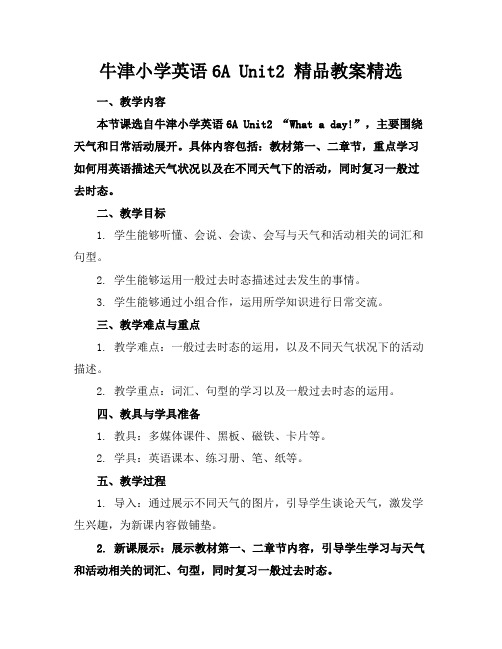
牛津小学英语6A Unit2 精品教案精选一、教学内容本节课选自牛津小学英语6A Unit2 “What a day!”,主要围绕天气和日常活动展开。
具体内容包括:教材第一、二章节,重点学习如何用英语描述天气状况以及在不同天气下的活动,同时复习一般过去时态。
二、教学目标1. 学生能够听懂、会说、会读、会写与天气和活动相关的词汇和句型。
2. 学生能够运用一般过去时态描述过去发生的事情。
3. 学生能够通过小组合作,运用所学知识进行日常交流。
三、教学难点与重点1. 教学难点:一般过去时态的运用,以及不同天气状况下的活动描述。
2. 教学重点:词汇、句型的学习以及一般过去时态的运用。
四、教具与学具准备1. 教具:多媒体课件、黑板、磁铁、卡片等。
2. 学具:英语课本、练习册、笔、纸等。
五、教学过程1. 导入:通过展示不同天气的图片,引导学生谈论天气,激发学生兴趣,为新课内容做铺垫。
2. 新课展示:展示教材第一、二章节内容,引导学生学习与天气和活动相关的词汇、句型,同时复习一般过去时态。
a. 学习词汇:sunshine、cloudy、windy、rainy、sunny、yesterday等。
b. 学习句型:What was the weather like? It was What did you do? I3. 实践情景引入:分组进行角色扮演,让学生在模拟的天气情景中进行对话练习,巩固所学知识。
4. 例题讲解:结合教材中的例题,讲解一般过去时态的用法,并进行随堂练习。
5. 小组合作:学生分组,根据所给话题进行讨论,运用所学知识进行交流。
六、板书设计1. Unit2 What a day!2. 重点词汇:sunshine、cloudy、windy、rainy、sunny、yesterday等。
3. 重点句型:What was the weather like? It was What did you do? I4. 一般过去时态结构:主语 + 动词过去式 + 其他。
(英语试卷)6A Unit 2测试卷及听力答案
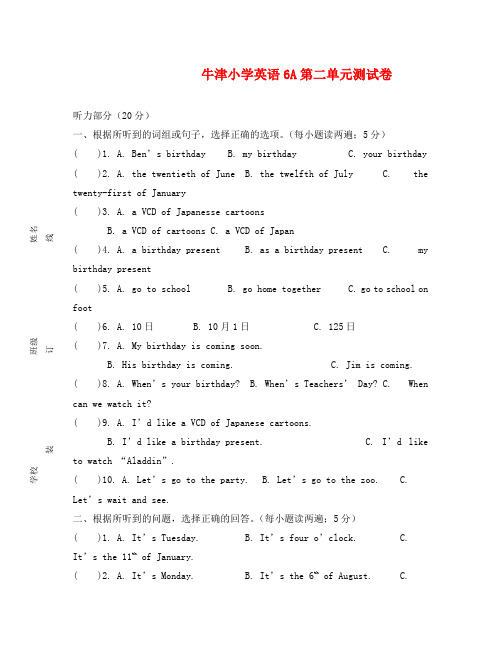
牛津小学英语6A 第二单元测试卷听力部分(20分)一、根据所听到的词组或句子,选择正确的选项。
(每小题读两遍;5分) ( )1. A. Ben ’s birthdayB. my birthdayC. your birthday( )2. A. the twentieth of June B. the twelfth of July C.thetwenty-first of January( )3. A. a VCD of Japanesse cartoons B. a VCD of cartoons C. a VCD of Japan ( )4. A. a birthday present B. as a birthday presentC. mybirthday present( )5. A. go to schoolB. go home togetherC. go to school onfoot( )6. A. 10日B. 10月1日C. 125日( )7. A. My birthday is coming soon. B. His birthday is coming.C. Jim is coming.( )8. A. When ’s your birthday? B. When ’s Teachers ’ Day? C. Whencan we watch it?( )9. A. I ’d like a VCD of Japanese cartoons. B. I ’d like a birthday present. C. I ’d liketo watch “Aladdin ”.( )10. A. Let ’s go to the party. B. Let ’s go to the zoo. C.Let ’s wait and see.二、根据所听到的问题,选择正确的回答。
(每小题读两遍;5分) ( )1. A. It ’s Tuesday. B. It ’s four o ’clock. C.It ’s the 11thof January. ( )2. A. It ’s Monday.B. It ’s the 6th of August.C.学校_________________________ 班级______________________姓名_________________________------------------------------装--------------------------------订------------------------------------线---------------------------------It’s on the 6th of August.( )3. A. Puppet. B. Thank you. C. I like it very much.( )4. A. Yes, I can. B. Sure. C. Happy birthday.( )5. A. Yes, I am. B. No, you don’t. C. Yes, I do.三、听对话,根据所给的问题,选择正确答案。
牛津小学英语6AUnit2教案精选
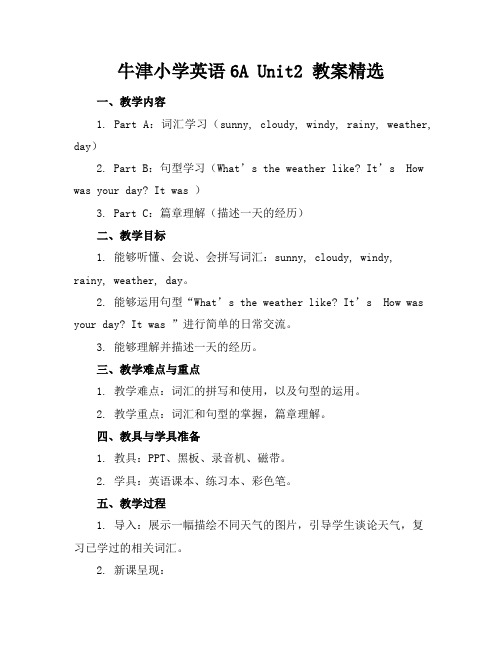
牛津小学英语6A Unit2 教案精选一、教学内容1. Part A:词汇学习(sunny, cloudy, windy, rainy, weather, day)2. Part B:句型学习(What’s the weather like? It’s How was your day? It was )3. Part C:篇章理解(描述一天的经历)二、教学目标1. 能够听懂、会说、会拼写词汇:sunny, cloudy, windy, rainy, weather, day。
2. 能够运用句型“What’s the weather like? It’s How was your day? It was ”进行简单的日常交流。
3. 能够理解并描述一天的经历。
三、教学难点与重点1. 教学难点:词汇的拼写和使用,以及句型的运用。
2. 教学重点:词汇和句型的掌握,篇章理解。
四、教具与学具准备1. 教具:PPT、黑板、录音机、磁带。
2. 学具:英语课本、练习本、彩色笔。
五、教学过程1. 导入:展示一幅描绘不同天气的图片,引导学生谈论天气,复习已学过的相关词汇。
2. 新课呈现:a. 通过PPT展示,学习词汇:sunny, cloudy, windy, rainy, weather, day。
b. 利用句型“What’s the weather like? It’s ”进行师生互动,练习词汇。
c. 学习句型“How was your day? It was ”,结合实际情景进行角色扮演。
3. 例题讲解:结合教材中的例句,讲解词汇和句型的用法。
4. 随堂练习:让学生用所学词汇和句型,描述他们的一天。
5. 小组活动:学生分组,根据所给情景,用英语进行交流,描述各自的天气和经历。
六、板书设计1. 词汇:sunny, cloudy, windy, rainy, weather, day2. 句型:What’s the weather like? It’sHow was your day? It was七、作业设计1. 作业题目:a. 用所学生词和句型,编写一段关于自己一天经历的对话。
牛津小学英语6A教案unit 2

牛津英语6A教案Unit 2 Public signs第一课时教学目标:1.能听懂、会说、会读和会拼写单词:mean, danger, should, shouldn’t, litter, park, cycle.2.能听懂、会说和会读单词和词组:public, a sign, grass, quiet, touch, keep off.3.能听懂、会说、会读和会写句型:What does it meam? It means you shouldn’t …教学重点:1.能正确听说读会写句型:What does it meam? It means you shouldn’t …2.能正确能听说读写单词:mean, danger, should, shouldn’t, litter, park, cycle.教学过程:一. Everyday English:How are you?Pass the ball to …Give the pen to …Where’s …What’s the score?二.Presentation and practise:1. T: Let’s go the the park.(多媒体展示公园情景,出现许多公共标志牌) T: What’s this?It’s public signs.Learn : public signs.T: Let’s look at some public signs on the Internet.多媒体展示九个标志。
T: Can you read them?学生能朗读其中的八个:No parking. No eating and drinking. Keep quiet. Do not touch.通过复习帮助学生巩固以上四句话。
Park以前所学的意思是公园,在这里的意思是停车。
2.T: (Point to a sign)What does this sign mean?板书:What does this sign mean?学习这句话,讲解mean的意思及其中ea的发音。
上海牛津6A-Test-for-Unit-2
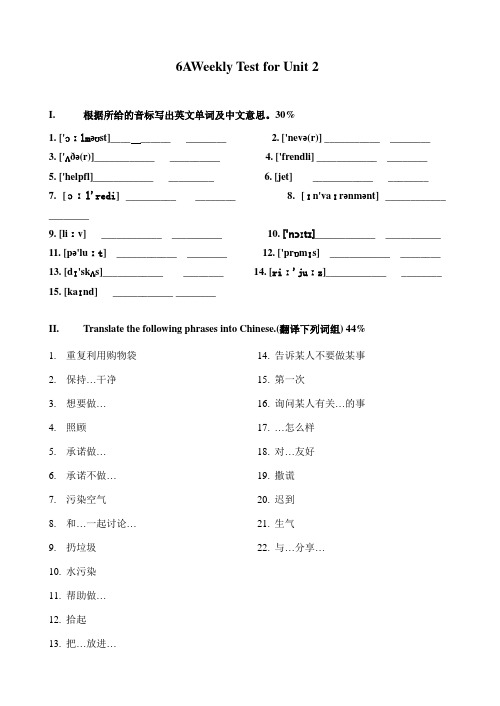
6AWeekly Test for Unit 2I.根据所给的音标写出英文单词及中文意思。
30%1. ['ɔːlməʊst]____ ______ ________2. ['nevə(r)] ___________ ________3. ['ʌðə(r)]____________ __________4. ['frendli] ____________ ________5. ['helpfl]____________ _________6. [jet]____________ ________7. [ɔːl'redi] __________ ________ 8. [ɪn'vaɪrənmənt] ____________ ________9. [liːv]____________ __________ 10. ['nɔːtɪ]____________ ___________ 11. [pə'luːt]____________ ________12. ['prɒmɪs]____________ ________ 13. [dɪ'skʌs]____________ ________ 14. [riː'juːz]____________ ________ 15. [kaɪnd]____________ ________II.Translate the following phrases into Chinese.(翻译下列词组) 44%1.重复利用购物袋___________________2.保持…干净______________________3.想要做…_________________________4.照顾_____________________________5.承诺做…_________________________6.承诺不做… _______________________7.污染空气________________________8.和…一起讨论… ___________________9.扔垃圾__________________________10.水污染__________________________11.帮助做… ________________________12.拾起___________________________13.把…放进… ______________________ 14.告诉某人不要做某事____________15.第一次_________________________16.询问某人有关…的事___________17.…怎么样_____________________18.对…友好_____________________19.撒谎_____________________20.迟到_____________________21.生气______________________22.与…分享…_________________-----WORD格式--可编辑--专业资料-----III.Fill in the blanks with the given words in their proper forms.(用所给单词的适当形式填空) (6%)1.He is my good friend. He is always ____________ (friend) to me.2.Different sports are ____________ (help) to our health..3.Shanghai has many tall buildings. There is much light ____________ (pollute) in the city.4.The policemen like to help ____________ (others) people.5.It’s very ____________ (kindness) of you.6.The children will eat ____________ (they) lunch in the park..IV.Rewrite the sentences as required.(20%)1.Kitty would like to be a doctor in the future.(保持原意)Kitty ____________ ___________be a doctor in the future.2.I have already been to the USA.(改为一般疑问句)____________ you been to the USA ____________?3.We promise to keep our school clean. (划线提问)____________ do you promise to ____________?4.I have lived in Shanghai for more than 2o years. (改为否定句)I ____________ ___________ in Shanghai for more than 20 years.5.Alice and Kitty are good friends. (划线提问)____________ ___________ good friends.6.They like to help each other. (划线提问)____________ ____________ they like____________ ____________?7.I like to play with my friends.(划线提问)____________ do you like to ____________?8.I’m going there next Saturday. (划线提问)____________ __________ you going there?9.Friends of the Earth take care of the environment.(保持原意)Friends of the Earth ____________ ___________ the environment.--完整版学习资料分享----。
沪教版牛津小学英语6A教案Module2Unit1period1
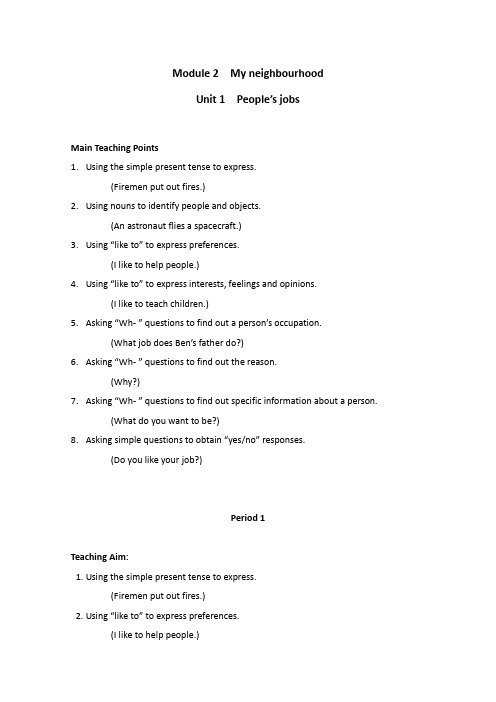
Module 2 My neighbourhoodUnit 1 People’s jobsMain Teaching Pointsing the simple present tense to express.(Firemen put out fires.)ing nouns to identify people and objects.(An astronaut flies a spacecraft.)ing “like to” to express preferenc es.(I like to help people.)ing “like to” to express interests, feelings and opinions.(I like to teach children.)5.Asking “Wh- ” questions to find out a person’s occupation.(What job does Ben’s father do?)6.Asking “Wh- ” questions to find out th e reason.(Why?)7.Asking “Wh- ” questions to find out specific information about a person.(What do you want to be?)8.Asking simple questions to obtain “yes/no” responses.(Do you like your job?)Period 1Teaching Aim:1. Using the simple present tense to express.(Firemen put out fires.)2. Using “like to” to express preferences.(I like to help people.)3. Asking “Wh- ” questions to find out a person’s occupation.(What job does Ben’s father do?)4. Asking “Wh- ” questions to find out the reason.(Why?)Teaching Materials:1.Book 6A Page 172.Cassette 6A & Cassette player3.Some photos (people & jobs)Teaching Procedure:1.Pre-task preparation: (5 minutes)Hello class, today we’ll learn Module 2 Unit 1: People’s jobs. I know actually it is too early to talk about “job” with you, but I think most of your parents have their jobs. For instance: My job is a teacher. I teach the students English. So, who can tell me what job does your father or mother do?Oh, I’ve heard a lot of jobs. Now, I’ve some questions for you to answer. (Whole class)1) Whose father is an engineer? 2) Whose mother is a public servant?3) Whose father is a business man? 4) Whose mother is a nurse?5) What does a doctor do? 6) What does an accountant do?2. While-task procedure1) Listen to the tape and answer the questions. (5 minutes)Now, let’s listen to the tape but not open your books. Think it over: Who visit Rose Garden School? (Yes, Mark’s father visits Rose Garden School. Ben and Kitty are also in this school. )Now, let’s go on listening. What are they talking about? (They are talking about Mark’s father’s job)2) Let the students open the books and talk about the pictures and then do T/F question on Page 17 below. (10 minutes)Now, open your books and turn to page 17.1. What job does Mark’s father do? (He is a fireman.)2. What does he usually do? (He usually drives a fire-engine and put out fires.)3. Does Mark’s father like his job? (Yes, he does.)4. Why? (Because he likes to help people and put out fires.)3) Read after the tape twice. (5 minutes)4) Explain some useful words and phrases. (5 minutes)a. put out firesb.fire-engine &firemanc. Firemen put out fires.d. What job does Ben’s fathe r do?3. Post-task activity (10 minutes)Now, it’s your turn. I’ll give you 3 minutes to prepare. Make a dialogue about jobs (whether your parents/uncle/auntie/brother/sister) but use the patterns and phrases we’ve learnt just now.4.HomeworkWorkbook Page 8。
牛津小学英语6AUnit2第二课时教案
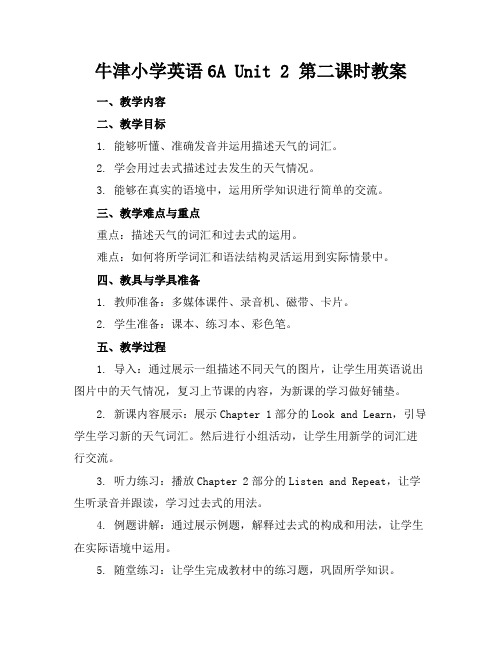
牛津小学英语6A Unit 2 第二课时教案一、教学内容二、教学目标1. 能够听懂、准确发音并运用描述天气的词汇。
2. 学会用过去式描述过去发生的天气情况。
3. 能够在真实的语境中,运用所学知识进行简单的交流。
三、教学难点与重点重点:描述天气的词汇和过去式的运用。
难点:如何将所学词汇和语法结构灵活运用到实际情景中。
四、教具与学具准备1. 教师准备:多媒体课件、录音机、磁带、卡片。
2. 学生准备:课本、练习本、彩色笔。
五、教学过程1. 导入:通过展示一组描述不同天气的图片,让学生用英语说出图片中的天气情况,复习上节课的内容,为新课的学习做好铺垫。
2. 新课内容展示:展示Chapter 1部分的Look and Learn,引导学生学习新的天气词汇。
然后进行小组活动,让学生用新学的词汇进行交流。
3. 听力练习:播放Chapter 2部分的Listen and Repeat,让学生听录音并跟读,学习过去式的用法。
4. 例题讲解:通过展示例题,解释过去式的构成和用法,让学生在实际语境中运用。
5. 随堂练习:让学生完成教材中的练习题,巩固所学知识。
6. 小组活动:分组进行角色扮演,模拟真实情景,用过去式描述过去的天气情况。
六、板书设计1. Unit 2 What a day!2. 主要内容:天气词汇:sunny, cloudy, windy, rainy, etc.过去式:was/were + 动词过去式七、作业设计1. 作业题目:请用过去式描述昨天和今天的天气情况。
答案示例:Yesterday was sunny. We played basketball in the park. Today is cloudy. We need to bring an umbrella to school.2. 完成教材中的练习题。
八、课后反思及拓展延伸1. 反思:本节课学生能够积极参与,课堂气氛活跃。
但在小组活动中,部分学生仍存在语法错误,需要课后加强辅导。
- 1、下载文档前请自行甄别文档内容的完整性,平台不提供额外的编辑、内容补充、找答案等附加服务。
- 2、"仅部分预览"的文档,不可在线预览部分如存在完整性等问题,可反馈申请退款(可完整预览的文档不适用该条件!)。
- 3、如文档侵犯您的权益,请联系客服反馈,我们会尽快为您处理(人工客服工作时间:9:00-18:30)。
Test for Module2Part one Listening(第一部分听力)一. Listen and choose the right pictures (根据你听到的内容,选出相应的图片)1._________2._________3._________4._________5._________二、Listen to the dialogues and choose the best answer to the question you hear (根据你听到的对话和问题,选出最恰当的答案)( )6. A.Snowy. B. Rainy. C. Sunny. D. Cloudy.( )7.A.In a supermarket. B.In a bookstore. C.In a library. D.In a ticket office.( )8. A. A teacher. B. A businessman. C. A policeman. D. An engineer.( )9.A.The match was interesting. B.The match was exciting.C.The match was boring.D.The match was relaxing.( )10.A.writer and reader. B.teacher and student. C. Brother and sister. D.Mother and son. ( )11. A. 7:30. B. 7:45. C. 7:00. D. 7:15.( )12.A.English. B.Maths. C.English and maths. D.Chinese.( )13.A.Two hours. B.An hour and a half. C.105 minutes. D.135 minutes.三.Listen to the passage and tell whether the following statements are true or false (判断下列句子是否符合你听到的短文内容,符合的用’’T’’表示,不符合的用’’F’’表示)( )14.Bruno'father works in a shop and his mother works in a c inema.( )15.Bruno takes a bus to school and goes home on foot.( )16.Bruno likes to play with water.( )17.Bruno's father wants to punish him but his mother doesn’t.( )18.Bruno's clothes are wet because he plays in the rain.( )19.Bruno doesn’t want to play in the water the third day.四.Listen to the passage and complete the following sentences (听短文,完成下列内容,每空格限填一词)20.The paper of books and__________ is made from wood.21.Many people burn wood to keep themselves__________ in winter.22. __________, wood is very important for our living.23.People cut__________ trees in mountains every year.24.We have to take __________care of our mountains so that they may always be covered withgreen trees.Part Two Vocabulary and Grammar(第二部分词汇和语法)一.Choose the best answer (选择最恰当的答案)( )25. Which of the following underlined parts is different in pronunciation from the others?A.wouldB.womanC.putD.naughty( )26. There is______ ''s'' and______''u'' in the word ''use''.A.a,aB.a, anC.an, anD.an, a( )27. Mary is swimming______the river.A.to acrossB.acrossC.crossD.crossing( )28.- -I am leaving for the exam.—Well, make sure you have got______ready.A.somethingB.anythingC.everythingD.nothing( )29. I can’t see the blackboard clearly. Two boys are sitting me.A.behindB.in front ofC.besideD.next to( )30. —Must I clean the room now?—No, you______. You can do it tomorrow.A.mustn’tB.can’t.C.don’tD.needn’t( )31. It is the library! So you______know shouting is not allowed here.A.canB.mustC.needD.may( )32. It is kind of you to______so much time showing me around your school.A.takeB.spendC.costD.have( )33. — It is all right to speak and laugh loudly______.—No, I don’t think so.A.in publicB.at least B.on time D. all the time( )34. The teacher asked Ben______a difficult question in class.A.answerB.answeringC.to answerD.answered( )35. Boys and girls,______up your hands when you know the answer.A. puttingB. to putC. putD. puts( )36. I______the film. I don’t want to see it again.A.have seenB.sawC.will seeD.see( )37. Tommy doesn’t visit his grandfather, but he______sends e-mails.A.hardlyB.neverC.ftenD.nearly( )38. — How do you do?______A.Fine, thank you.B.All right.C. How do you do?D. How are you?( )39. —Please bring little Tom here next time.—______. Thank you.A.I willB.I doC. That’s rightD. My pleasure二. Complete the following passage with the words or phrases in the box. Each can onlybe used once (将下列单词或词组填入空格。
每空格限填一词,每词只能填一次)A. alongB. acrossC. listD. distancesE. relativesA map is a picture of a place. There can be many different maps of the same place. A map cannot show everything about a place. For a clear map, it must show a number of things. Here, you will get to make a map which shows the things that make your community (社区)a special place to live in.Before you start drawing, make a 40 of the places and things in your community that you want to include on your map. Think about places you often have to go to, places where your 41 and friends live and your favorite places. How do you get there? What roads or paths do you take? What kind of things do you see 42 the way? As you know, some maps are made to show locations and other maps show us how to get there. They can also show the 43 .A. lightB. FirstC. NextD. think ofE. decideNow,let’s create a map of your community. On a large piece of paper, draw pictures of the places or the things you 44 to include on your map. 45,fill in the shapes of the places and roads in 46 colors. Using darker colors, fill in the areas between the features and roads on your map to make your map more interesting to look at. Every area of your map should be filled in with colors. When your map is finished, show it to your friends or family members to see what they 47 it. 40.________ 41. ________ 42. ________ 43. ________44. ________ 45. ________ 46. ________ 47. ________三. Complete the sentences with the given words in their proper forms (用括号中所给单词的适当形式完成下列句子。
